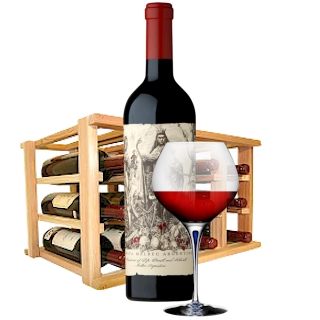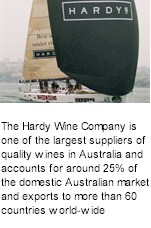


He established a winery on the banks of Adelaide's River Torrens in 1853. His Bankside winery was the start of an outstanding family wine business that grew to become one of the world's great wine companies. Thomas Hardy was a self-made man, a pioneer of immense character. With a mixture of energy, determination, shrewd judgment, innovation and a touch of daring, he pursued the highest standards in winemaking. At Bankside, and later at his McLaren Vale property Tintara, he focused on quality and craftsmanship. Tintara was to become the centre of Hardy's enterprise and by the late 1800s was one of the best-equipped and managed wineries in Australia. This success was substantially due to Hardy's initiatives in planting higher quality, lower yielding varieties rather than the coarser, heavier-yielding types more common at the time. His willingness to experiment with and to use novel equipment, much of which he designed and built himself, also contributed to this success.

By the time of his death in 1912 he would be hailed as the father of the South Australian wine industry, having first realised the potential of McLaren Vale. Through his Tintara winery, Hardy built his business into one of the nation's largest winemakers. Over 150 years, five generations have withstood two world wars, a Great Depression, the vagaries of a harsh climate and even personal tragedy, to create the great Australian business that eventually became part of the world's largest wine company.
By the mid 1970s five generations of the Hardy family had guided and shaped Thomas Hardy & Sons, overseeing expansion into new Australian viticultural regions and the introduction of technological advances. The great Thomas Hardy legacy lives on today at the Hardy Wine Company. Quality, flavour and character remain the cornerstones of its contemporary wines while respect for Hardy family history ensures the wines benefit from the lessons of long tradition.
In 1976, Thomas Hardy & Sons made its first major corporate acquisition with the purchase of the Emu Wine Company (actually owned in England), which included Western Australia's Houghton. The business completed a neat circle in 1982 by purchasing Chateau Reynella, as its founder, John Reynell, had introduced the young Thomas Hardy to winemaking. The family business became a public company in 1992, merging with Berri Renmano - a successful South Australian Riverland wine cooperative - to create BRL Hardy. BRL Hardy enjoyed outstanding success, developing the market for Australian wine around the world and establishing a network of global sales and marketing offices. As a result, Hardys became the largest-selling brand within the UK off-premise market.

For over 150 years, Hardys has crafted some of Australia's best-known and most popular wines. Taking the bounty of Australia's abundant sunshine and teaming it with the most precious resource water, Hardy's today grows the grapes that are best suited to the country's individual winegrowing regions. Thomas Hardy's ambition was to create quality wines that will be prized in the markets of the world. There is no shadow of a doubt this is still the principle that drives the Hardys winemakers today.
The company has established a network of global sales and marketing offices in the key markets of the world. In 2003, leading international beverage company, Constellation Brands, acquired BRL Hardy- a move that created the world's largest international wine business. It was decided to maintain the heritage of the Hardy name and the Australian business was renamed Hardy Wine Company. Today, the company has one of the broadest and most comprehensive portfolios with vineyards and wineries in all the major wine-producing regions including such iconic brands as: Hardys, Houghton, Moondah Brook, Leasingham, Stonehaven, Banrock Station, Renmano, Berri Estates, Chateau Reynella, Yarra Burn, Brookland Valley, Starvedog Lane, Kamberra and Bay of Fires.
The great Australian winemaking tradition are preserved, blending regions and varieties to make wines of character and complexity, with the positive hallmarks that the world had come to expect from Australia. At the same time, widely dispersed vineyard and winery resources retain strong regional identity, varietal purity and personality, under the banner of Hardy's regional wineries. As Australia matures into the globe's foremost winemaking nation, the Hardy's aim is to remain at the forefront with careful matching of grape cultivars and sites across Australia. From the very founding of Hardy Wines, the stage was set for the culture of practical innovation and quality to live on.
